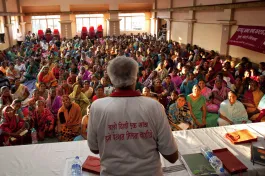Rajasthan's new law to extend certain welfare entitlements to platform-based gig workers has been making waves in recent months. Heralded as the first of its kind in India, the legislation was passed by the state assembly in July 2023 and also holds platforms accountable for contributing to this goal.
The Platform-Based Gig Workers (Registration and Welfare) Act, 2023 takes its cue from the Code on Social Security, 2020 that proposed a similar approach. The union labour ministry and other states are considering similar measures.
Many are excited about the passing of this well-intentioned bill. After all, most want to see gig workers – the app-based delivery personnel, on-demand drivers, personal care providers, and others – who have become such visible symbols of growing economic precarity, improve their conditions of work. The bill answers a moral and political call.
Yet, despite good intentions, much in this legislation is built on weak foundations, which will make it difficult to implement. This could potentially leave many gig workers in the same state of precarity they are in now.
Concerns
What is more, the visible struggles of gig workers opened the door to a national conversation about much needed reform of India’s social protection architecture that would extend access to a large and growing contingent of self-employed workers in informal employment. Instead of tackling the hard questions to step-by-step, build a universal system that covers a growing share of workers, we are settling for the same fragmented approach that has, so far, left millions without coverage.
The visible struggles of gig workers opened the door to a national conversation about much needed reform of India’s social protection architecture that would extend access to a large and growing contingent of self-employed workers in informal employment…
There are five key concerns with the act.
First, it subscribes to a tried and tested model of a welfare board, which is both flawed and inefficient.
Second, the board is charged with registering platforms and aggregators in the state. The platforms and aggregators are required to share their database of workers with the board. But many platforms and aggregators that engage workers in the state will be outside the jurisdiction of this legislation, ultimately affecting both the resources and the reach of the board.
Third, the act speaks to the needs of location-based gig workers, rather than geographically untethered web-based workers, many of whom are women. This is at a time when many have highlighed the opportunities that home-based gig work presents for improving the female labour force participation rate in the country. The invisibility of women in data, policy, and regulation is a continuing problem, which is also manifest in this legislation and its current scope.
Fourth, platforms and aggregators are supposed to provide updates on increases or decreases in the number of gig workers registered with them on a monthly basis. But the flexible and fast-paced nature of the tech-based gig economy means that changes will need to be recorded much more frequently than the act suggests.
Finally, there is much that still remains ambiguous, which will have to be carefully thought through and spelt out to have any chance of effective implementation on the ground. After all, the devil is always in the details.
Limits of welfare
The Rajasthan act sets up a Platform-based Gig Workers Welfare Board that levies on platforms a cess between 1% and 2% of every transaction. There are penalties if a platform fails to comply. This general operating model of welfare boards is a familiar one but their performance has been mixed at best.
Worker welfare boards and associated funds, central and state, are a widely used sector-specific mechanism for providing access to social protection to informal workers where the traditional employer-employee relationship is unclear. The fund is usually based on a cess, or tax, on the production or output in specified industries.
For instance, the Building and Other Construction Workers Welfare Cess Act, passed in 1996, mandates that all states form a welfare board that collects 1% of the construction cost from employers and developers. The amount raised is transferred to a dedicated fund which registers construction workers and brings them under the cover of existing welfare schemes.
Proving one’s eligibility, accessing entitlements, or filing claims entails completing cumbersome paperwork and application processes, which often excludes the most vulnerable who do not have the necessary documentation.
Many such welfare boards are sitting on large sums of unused funds. State governments and union territories cumulatively collected Rs 78,521 crore as cess, of which less than half – Rs. 35,399 crore – was spent, according to the labour ministry's annual report for 2022-23. Moreover, proving one’s eligibility, accessing entitlements, or filing claims entails completing cumbersome paperwork and application processes, which often excludes the most vulnerable who do not have the necessary documentation.
Welfare boards are what we know how to do. But they are not what work the best. Given the complexities of the gig economy, the challenges of effective execution are magnified.
As a first step, the gig workers' board must register platforms or aggregators that operate in the state. The platform or aggregator will then provide the board the data on all the platform-based gig workers they engage. Any changes in the numbers of gig workers must be updated within one month of such a change.
This poses the second challenge. Platforms and aggregators that are not registered in Rajasthan can recruit workers in the state, but cannot be required to pay the cess or share data on workers. These workers will be excluded, unless there is an option to self-register. But if workers self-register without the platform being held responsible for paying the cess and sharing transaction data, the board will end up with more workers subscribing for entitlements than collections. If the number of platforms or aggregators registered with the board is limited, the levy would need to change to ensure that the board can meet its statutory obligations to provide welfare and other entitlements.
This stands to be yet another example of a piece of legislation that … perpetuates the common practice of first crafting the policy or law and worrying about its impact on women later, if at all.
Third, some of the largest platforms that serve as intermediaries for micro-tasking and freelancing services are registered abroad. They will neither pay the cess nor register their workers. What is worse is that many of those who do this online work that is untethered to a location, often from home, are women.
This stands to be yet another example of a piece of legislation that is willing to overlook a significant contingent of working women. It perpetuates the common practice of first crafting the policy or law and worrying about its impact on women later, if at all.
Moreover, for better or worse, policymakers see this form of home-based gig work as a way to boost the female labour force participation rate, but the proposed legislation and general discourse to extend workers’ access to entitlements is largely centered on location-based workers and not on those working from home.
Fourth, flexibility is one of the key drivers of the gig economy. This means that workers can be on one or more platforms and that a platform can keep workers or lock them out based on ratings, temporarily or for the long term. This continuous churn means that platforms will need to constantly report changes to the board.
This will not only impose a significant administrative burden on the platform, but also on the board to manage the constant flow of information and calibrate the provision of entitlements accordingly, in real time. The cess that the act talks about is on transactions. It mentions nothing about collecting transaction-based data from platforms other than how many workers are registered.
Besides these challenges, there is much that is still ambiguous.
Will the board just collect registration data from platforms and aggregators, or also transaction data? What is the plan to protect this data and strike a balance between transparency and what is kept private to protect the worker and the platform or aggregator? Is there anything that will prevent the platform from shifting the cost of the cess to the consumer? Will the cess be on the value of the total transaction, or after the platform makes its deductions? What entitlements and rights will the board set out to deliver?
Will the general and specific schemes be determined on the basis of the needs of different types of gig workers … or will they be based on the problems of the most visible workers with the loudest voices?
The throngs of on-demand drivers waiting for their next ride; the drivers weaving in and out of traffic to make deliveries within a prescribed time; the young in-home beauty workers hauling massage tables in and out of autorickshaws are visible symbols that have drawn national (and global) attention to the poor working conditions of gig workers. They race against time, fight traffic, struggle with inclement weather, and are subject to unfair rating systems and other hurdles.
These conditions include inconsistent income; an ambiguous employment status that leaves gig workers without entitlements or labour protections; nefarious rating systems; algorithmic control and bias; and a lack of access to collective bargaining and redressal mechanisms. To what extent will this legislation address these concerns?
Will the general and specific schemes be determined on the basis of the needs of different types of gig workers – for instance, home-based workers – or will they be based on the problems of the most visible workers with the loudest voices?
The legislation sets up a grievance redressal mechanism, which is a commendable step, but much more detail is needed on the process of redressal and possibilities for escalation.
One step forward
For all these gaps, the act does some things well. For instance, it takes a step towards attempting to get platforms and aggregators to share their data. It also sets up a redressal mechanism for gig workers. The very proposal of this legislation and its passing is an admission of the government’s obligation to gig workers and its attempt to hold platforms and aggregators accountable.
However, more progressive legislation from around the world designates gig workers as employees so that they automatically fall within the purview of existing labour regulations and social protection.
In these aspects, the act holds up precious virtues. But virtues must translate into effective action, and ultimately outcomes. Many have celebrated the passing of this legislation, though the real win lies not in its passing but in its effective implementation. On implementation, we need to rethink the approach.
A few months ago, I was at a gathering of labour activists, including representatives of app-based workers and a few policymakers. They were discussing the tenets of such legislation for gig workers. There was great fervor and enthusiasm in the room, over excitement that a new board for gig workers would be a win for workers as well as for politicians who could demonstrate that they were sympathetic to the needs of workers.
I mustered the courage to raise some of these concerns. Immediately, several loud voices rang out, underscoring the moral virtues of the act that finally speaks of what gig workers deserve. Whether gig workers will actually get what they deserve was relegated to being another question for another time.
Sabina Dewan is president and executive director of the JustJobs Network, a senior visiting fellow at the Centre for Policy Research, New Delhi, and a non-resident fellow at the Carsey School of Public Policy, University of New Hampshire.










Gig workers should not be separate